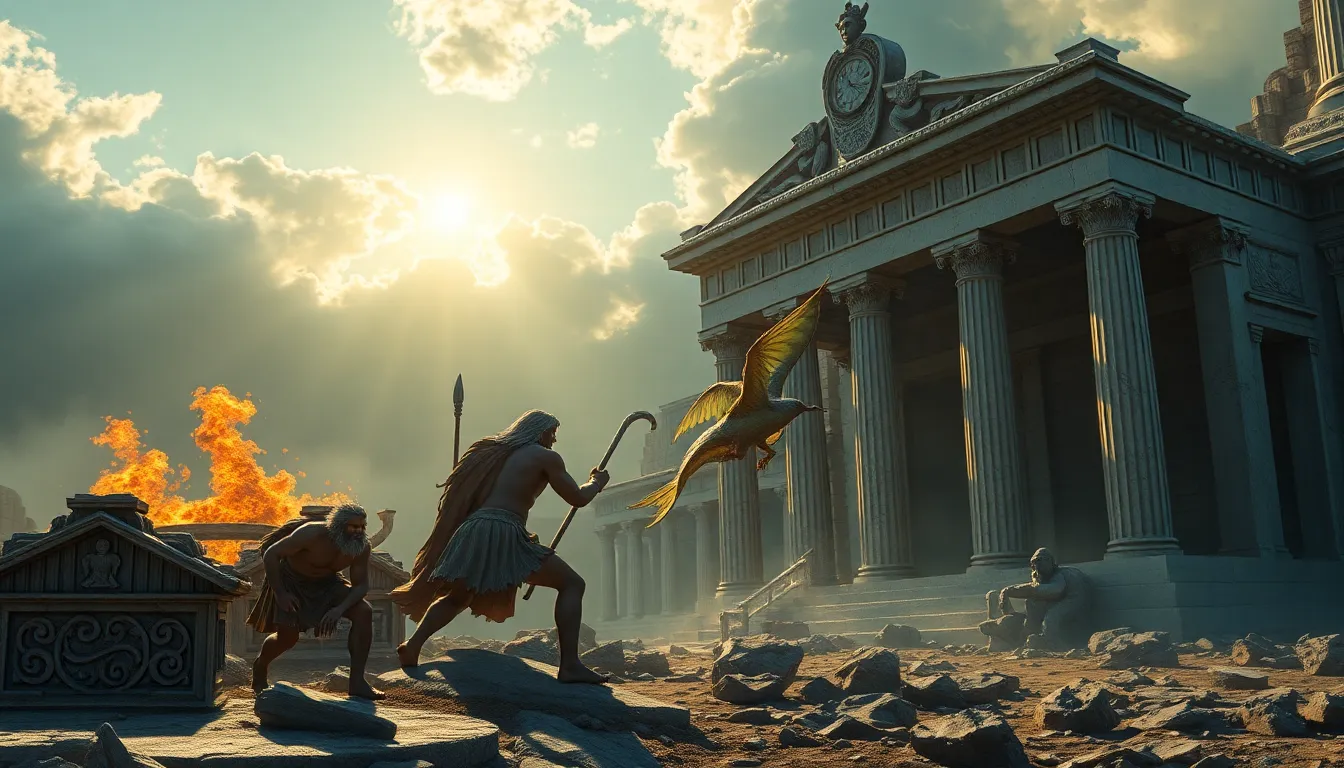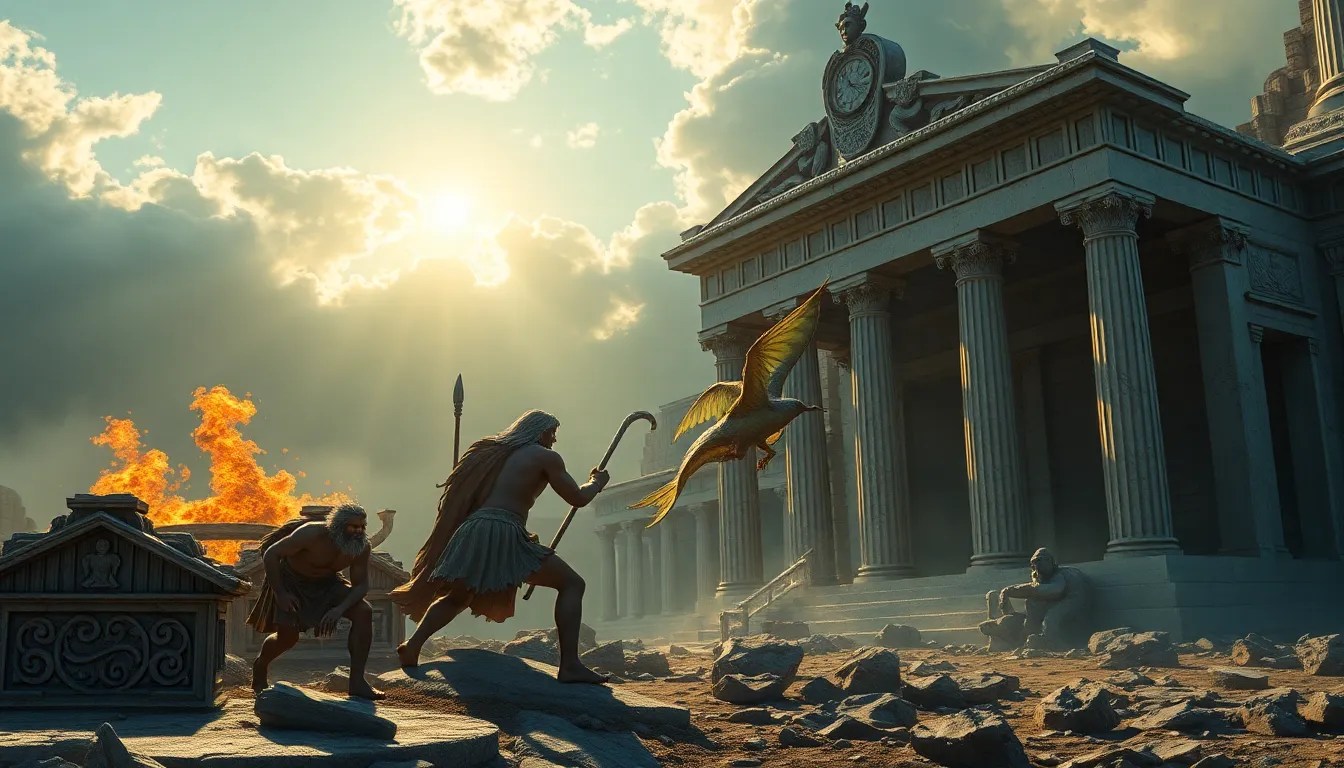The Titans’ Revenge: What If They Had Defeated the Olympians?
I. Introduction
Greek mythology is a rich tapestry of stories, gods, and legendary figures that have captivated human imagination for millennia. At the heart of these narratives lies the epic conflict between the Titans and the Olympians—a battle for supremacy that shaped the very fabric of the mythological world. The Titanomachy, as this conflict is known, represents themes of power, rebellion, and the cyclical nature of rule and rebellion.
This article aims to explore an alternative outcome of this monumental conflict: what if the Titans had emerged victorious against the Olympians? By examining this hypothetical scenario, we can gain insights into the implications for mythological narratives, the fate of the gods, and the future of humanity itself.
II. Background of the Titanomachy
The Titans were the first generation of divine beings, children of Gaia (Earth) and Uranus (Sky). They ruled during the Golden Age, a time of peace and prosperity, where they personified various aspects of the natural world. Key Titans included Cronus, Rhea, Oceanus, and Hyperion, each governing different realms of existence.
However, the reign of the Titans was not without strife. Cronus, fearing that his children would overthrow him, swallowed them at birth. Rhea, desperate to save her youngest child Zeus, hid him away and eventually orchestrated a rebellion. This revolt marked the beginning of the Titanomachy, a brutal ten-year war between the Titans and their offspring, the Olympians, which included Zeus, Hera, Poseidon, and Hades.
The conflict culminated in the Olympians’ victory, leading to the imprisonment of the Titans in Tartarus, a deep abyss used as a dungeon of torment. This marked a significant shift in power and established the Olympians as the new rulers of the cosmos.
III. Alternate Scenario: Titans’ Victory
Imagine a scenario where the Titans, through a series of fortuitous events, manage to defeat the Olympians. Several conditions could contribute to this hypothetical victory:
- Unity Among the Titans: If the Titans had united more effectively against the Olympians, leveraging their strengths and advantages, they could have overwhelmed their younger counterparts.
- Strategic Alliances: The Titans could form alliances with other mythical beings, such as the Giants or even the primordial deities. This collective strength could shift the war’s dynamics.
- Utilization of Titan Powers: The Titans possessed immense powers over nature. If they harnessed these abilities more strategically, they could have created devastating natural disasters to disrupt the Olympians’ plans.
The key battles of this alternate Titanomachy would involve significant confrontations, such as the Battle of Phlegra, where the Titans could deploy their full might against the Olympians. By outnumbering them and using their elemental powers, the Titans could gain the upper hand, leading to a potential defeat of Zeus and his siblings.
IV. The Titans’ Rule: A New Era
If the Titans had triumphed, the world would enter a new era characterized by their governance. The Titans’ rule would likely result in several notable changes:
- Governance: The Titans, with their varied domains, might establish a decentralized form of governance, where each Titan rules over a specific aspect of the world—Cronus over time, Oceanus over the seas, and Hyperion over the sun.
- Society and Culture: The societal norms under Titan rule could reflect their nature. Rather than the more human-like Olympians, Titans might promote a more primal relationship with nature, emphasizing respect and reverence for the earth.
- Fate of the Olympians: The defeated Olympians could face various fates: imprisonment in Tartarus, exile to distant realms, or even annihilation if the Titans sought to eradicate any threat to their rule.
V. Impact on Mythological Narratives
The triumph of the Titans would have profound implications for Greek mythology as we know it. The myths would evolve significantly, introducing new stories and characters:
- New Narratives: With the Titans as rulers, we might witness the emergence of new tales centered around their governance, their interactions with mortals, and the challenges they face from remnants of the Olympians.
- Character Development: Characters like Zeus and Hera would transform into tragic figures, perhaps leading to stories of their attempts to reclaim power or navigate their new lives in exile.
- Altered Relationships: The dynamics between gods and mortals would shift, as Titans might either engage with humanity benevolently or impose stricter rules over them.
VI. Consequences for Humanity
The Titans’ perspective on humanity would likely shape the human experience in significant ways. Depending on their disposition, humanity could either thrive or suffer:
- Benevolence or Oppression: If the Titans viewed humanity positively, they might nurture human development, leading to advancements in culture and technology. Conversely, if they saw mortals as inferior beings, oppression could ensue, limiting human freedom and growth.
- Divine Intervention: The nature of divine intervention would change. Unlike the Olympians, who often intervened in human affairs with personal motives, the Titans might engage in more systematic governance, impacting agriculture, seasons, and natural disasters more predictably.
- Cultural Advances: Under Titan rule, society might develop a deeper connection to the earth, resulting in advancements in agriculture, architecture, and philosophy that align more closely with nature.
VII. Modern Interpretations and Adaptations
This alternate history of the Titanomachy could inspire a wealth of literature and media, influencing modern interpretations of Greek mythology. Authors and creators might explore various themes arising from the Titans’ revenge:
- Literary Works: Contemporary novels and stories could reimagine the Titan-Olympian conflict, focusing on the moral ambiguities of power and the consequences of rebellion.
- Film and Television: Movies and series could depict the Titans’ rule, showcasing their interactions with mortals and Olympians, emphasizing themes of tyranny versus benevolence.
- Philosophical Themes: The moral implications of power dynamics, loyalty, and the nature of divinity could be explored, prompting audiences to reflect on the nature of authority and rebellion.
VIII. Conclusion
The Titanomachy serves as a foundational narrative in Greek mythology, embodying the eternal struggle for power and the consequences that arise from it. Reflecting on what could have happened if the Titans had defeated the Olympians invites us to consider the delicate balance of power, the nature of rule, and the cyclical patterns of history.
In contemplating this alternate scenario, we not only enrich our understanding of these ancient myths but also open ourselves to exploring new storytelling possibilities. The implications of a Titan victory extend beyond mythological narratives, inviting us to reflect on our own societal structures and the dynamics of power in the human experience.
As we continue to explore alternative mythological scenarios, we can uncover deeper truths about our world, our stories, and the timeless themes that connect us to these ancient legends.




